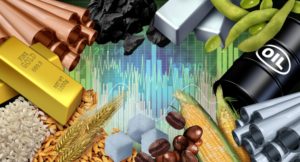Market Update 20th May 2024

Hot Commodities
A few Innovations ago Robert talked about equity and bond correlations, and the importance of alternative investments to increase diversification and produce better risk adjusted returns within a portfolio. Alternatives can take a few forms, one particular area which sits within real assets and has been exciting this year has been commodities, with a number having gone up significantly.
Commodities are impacted differently by variables like geopolitics and climate change. Gold and oil are often used as a geopolitical hedge for example, and so have benefitted quite significantly this year. Agriculture is impacted by supply and demand inconsistencies, resulting from changes in weather conditions. For example, cocoa has been the outperformer within agriculture this year due to shortages. And due to extreme heat in Vietnam, demand for Arabica coffee beans increased as expectations of a supply shortage occurred.
Usually, gold is a safe haven during high inflation because it is a real asset and retains its value, and this has driven a rally in the gold price. The situation in the Middle East has also supported gold prices further and keeps demand strong as a geopolitical hedge. To add to this gold rally, Asian central banks have been buying significant amounts of gold reserves over the past few years and this strong trend has continued into 2024. China’s reserve gold assets are at their highest since 2015. The Reserve Bank of India added 19 tonnes of gold to its reserves from January to end of April (that’s more than their total purchases for 2023). The demand remains for gold all over Asia, with buyers in Singapore, Hong Kong and Japan all paying premiums to the spot price in recent months. Using gold bullion in a portfolio provides diversification and a margin of safety when bonds and equities are positively correlated.
Oil is another beneficiary of geopolitical uncertainty. Middle East tensions with Israel and Iran supported a surge in oil prices. Iran is the seventh largest oil producer globally, and has the Strait of Hormuz located at its border. The Strait sees about 20% of the world’s oil supply go through it. So geopolitical tensions involving Iran are watched closely by markets for its impact on oil. However, demand for oil came in lower than expected for Q1 of 2024 and projected growth has been reduced for the rest of 2024 and 2025. This has been influenced by expanding electric vehicle fleets and vehicle efficiencies.
As an asset class, commodities can have contradictory uses in a portfolio in terms of ESG. Energy has been historically seen as a ‘dirty’ sub-asset class. Oil is often excluded from many portfolios due to the environmental impacts it has whilst being extracted as well as its later uses. However, European Carbon Allowances (EUA) also sit in that sector and are a much cleaner part of energy as EUAs reflect the cost of producing emissions and will ultimately encourage businesses to reduce their emissions.
Industrial metals also hold significant importance for the green energy transition. Copper and aluminium are used in EVs. The average EV holds about 200 pounds of copper (3-5x the content of an internal combustion engine vehicle), so demand for these metals has already increased and we will see this trend continuing.
We speak a lot about industrial metals to various fund managers. Supply will be the main issue, but it will have a price positive impact. The London Metals Exchange recently banned all copper, aluminium, and nickel of Russian origin, so supply will be tightened and will push prices up for these metals, both on exchange and outside the exchange system. Around 90% of the aluminium coming through the LME is of Russian origin so will be a big shift.
Modern Portfolio Theory tells us that diversification is key within a portfolio in order to get better risk adjusted returns. Alternatives are a huge and diverse space and I think will have a more important role to play in portfolios going forward. Geopolitics, de-globalisation, and the energy transition are making commodities an exciting and interesting asset class, and these long-term drivers will probably mean prices and demand remain high.
Emily Cave – Research Analyst

Hawksmoor Investment Management Limited is authorised and regulated by the Financial Conduct Authority (www.fca.org.uk) with its registered office at 2nd Floor Stratus House, Emperor Way, Exeter Business Park, Exeter, Devon EX1 3QS. This document does not constitute an offer or invitation to any person in respect of the securities or funds described, nor should its content be interpreted as investment or tax advice for which you should consult your independent financial adviser and or accountant. The information and opinions it contains have been compiled or arrived at from sources believed to be reliable at the time and are given in good faith, but no representation is made as to their accuracy, completeness or correctness. The editorial content is the personal opinion of Emily Cave. Other opinions expressed in this document, whether in general or both on the performance of individual securities and in a wider economic context, represent the views of Hawksmoor at the time of preparation and may be subject to change. Past performance is not a guide to future performance. The value of an investment and any income from it can fall as well as rise as a result of market and currency fluctuations. You may not get back the amount you originally invested. Currency exchange rates may affect the value of investments.
View more news
